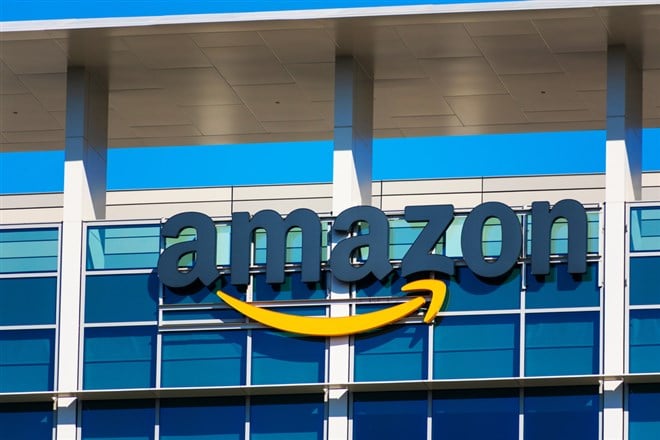
Amazon.com Inc. (NASDAQ: AMZN) came in better than expected for the third quarter. However, Amazon’s stock fell 13% during market hours as the company warned that the outlook for both the retail operations and AWS will be weaker than previously forecasted for the fourth quarter.
Why is Amazon stock falling? Management warned that sales are not living up to expectations despite the holiday season just around the corner and the outlook has worsened. This goes against the general e-commerce industry, where competitors such as Shopify Inc. (NYSE: SHOP), witnessed its stock rise significantly after both revenue and earnings beat expectations. Amazon’s management has forecasted that fourth quarter revenue will increase by anywhere from 2% to 8%, with revenue coming at $140 billion to $148 billion. This compares to the $155 billion forecasted by analysts, according to Refinitiv. Despite these headwinds, institutional investors have continued to bet on the long-term fortunes of the stock.
Revenue Comes in Stronger than Expected
Revenue increased by 15% in the third quarter, which means that Amazon has grown by double digits compared to previous quarters. Amazon’s new CEO, Andy Jassy, has in recent times responded to the macroeconomic headwinds by cutting costs and reducing capital expenditure. He also reduced warehouse capacity as the company looked to reassess spending.
Retail operations
Amazon’s growth has been affected primarily by the increasing levels of inflation, which have remained around 8% in recent months. The high inflation affects the retail business as consumers cut back on spending.
North American sales increased by 20% year over year (YOY), to $78.8 billion, compared to international sales, which declined by 5% to $27.7 billion but increased by 12% on a currency-adjusted basis. Sales are clearly increasing for the retail sector but a stronger dollar, which is likely to only get stronger, weighs on growth. Pessimism might be overdone because the current run rate is on a positive trajectory and consumer sentiment hasn’t cratered enough to justify market pessimism.
AWS
AWS slowed slightly, with growth coming in at 27% YOY. AWS has been the key to Amazon’s cash flow. Total revenue from the segment came in at 28% when adjusted for foreign exchange rates. The slowdown shouldn’t be surprising considering the technology sector has faced layoffs and demand slowed far more than other sectors. While 27% is still a high rate of growth, it's slower than what investors have gotten accustomed to.
Subscription Services
Subscription services have also slowed from high double-digit growth and are now in the single-digits following the trends of the likes of Netflix (NASDAQ: NFLX) and general content-based businesses, all of whom have seen a significant slowdown. Content faces both pricing pressure and high cost of production, which weighs on results.
Advertising Services
Advertising services have seen a strong return as growth increased to 25% for the quarter, up from the previous quarter, where growth came in around 13% to 15%. Advertising spending has pared back in recent times but Amazon’s execution has meant the performance of the segment is going against the general trend.
Amazon’s Financial Performance
Amazon’s stock fell as far as it did due to the significant decline in cash flow. Operating cash flow declined by 27% YOY, coming in at $39 billion. Meanwhile, capital expenditure increased by 14%. Despite decreasing repayment of principal leases, free cash flow fell to -$19 billion compared to $12 billion in the previous quarter. Amazon isn’t going to pare back its capital expenditures. Therefore, cash flow may remain under pressure for a while. Operating income has fallen to low single digits (2%) and cash flow will be under pressure for a while. Cash and marketable securities currently stand at around $96 billion so the company shouldn’t face any liquidity issues.
Amazon’s Outlook
Amazon’s outlook is clearly not as gloomy as the market expects, despite the current environment where currency headwinds and slowing retail sales weigh down results. The current average analyst target price is $175, representing a 58% upside. This might be on the higher side, with a far more reasonable target of $125 to $127, with an upside of around 15%. Price-to-sales fell to 2.44 as earnings per share took a significant hit. Net income margins are likely to get back to 7% to 8% in the longer term and the forward P/E will likely be around 30-35. The fourth quarter should come in better than investors believe, with the top line continuing to grow at a moderate pace. Income and cash flow are likely to be under pressure for a few more quarters.





